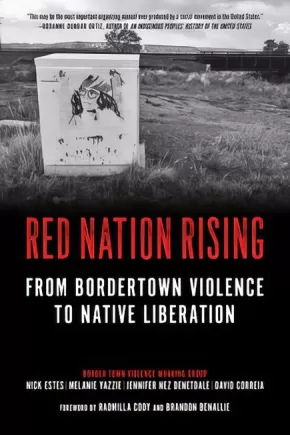Melanie K. Yazzie
Melanie K. Yazzie (Diné) is an assistant professor in the Departments of Native American Studies and American Studies at the University of New Mexico. She organizes with the Red Nation, an indigenous-led leftist organization committed to indigenous liberation. She is lead editor of Decolonization: Indigeneity, Education & Society, an international journal committed to public intellectualism and social justice.
Books (1)
Synopsis:
Red Nation Rising is the first book ever to investigate and explain the violent dynamics of bordertowns. Bordertowns are white-dominated towns and cities that operate according to the same political and spatial logics as all other American towns and cities. The difference is that these settlements get their name from their location at the borders of current-day reservation boundaries, which separate the territory of sovereign Native nations from lands claimed by the United States.
Bordertowns came into existence when the first US military forts and trading posts were strategically placed along expanding imperial frontiers to extinguish indigenous resistance and incorporate captured indigenous territories into the burgeoning nation-state. To this day, the US settler state continues to wage violence on Native life and land in these spaces out of desperation to eliminate the threat of Native presence and complete its vision of national consolidation “from sea to shining sea.” This explains why some of the most important Native-led rebellions in US history originated in bordertowns and why they are zones of ongoing confrontation between Native nations and their colonial occupier, the United States.
Despite this rich and important history of political and material struggle, little has been written about bordertowns. Red Nation Rising marks the first effort to tell these entangled histories and inspire a new generation of Native freedom fighters to return to bordertowns as key front lines in the long struggle for Native liberation from US colonial control. This book is a manual for navigating the extreme violence that Native people experience in reservation bordertowns and a manifesto for indigenous liberation that builds on long traditions of Native resistance to bordertown violence.
Reviews
“The authors of this brilliant exposition on bordertown violence are no ordinary academics, although academia would benefit from having more faculty scholars such as these. They are also master organizers, a part of a network of indigenous and other community organizers in Indian Country fueling the process of decolonization of Native lands and communities. Bordertown violence is as old as US colonization of the continent itself, and it persists today in the towns and cities that border Native reservations and communities all over US-claimed territory and is replicated in even more distant cities that have large Native populations, many of whom are homeless. This may be the most important organizing manual ever produced by a social movement in the United States.”—Roxanne Dunbar-Ortiz, author of An Indigenous Peoples’ History of the United States
“The borders racking our world are in constant motion and, like the explosive grinding of tectonic plates, the violence of this movement and resistance to it emerges most sharply at the edges. This essential volume brings together militant intellectuals to provide an accessible introduction to the violent encirclement of indigenous communities, and to provide crucial concept-weapons to deepen ongoing collective resistance.” —George Ciccariello-Maher, author of Decolonizing Dialectics
“A remarkable body of work that effectively weaves long overdue native scholarship and historical analysis of settler colonialism with direct and timely frontline reports on the continuing bordertown wars and conflicts in occupied native territories. Offers a comprehensive framework for advancing present and future indigenous resistance and liberation struggles.”—John Redhouse (Diné)
Additional Information
176 pages | 6.00" x 9.00" | Paperback






